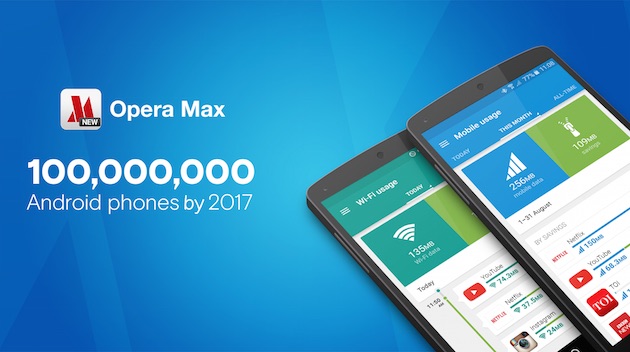Opera Max To Be Pre-Loaded On Over 100 Million Smartphones By 2017
Opera, the small browser company from Norway, announced that its data management app, Opera Max, has already been embedded in the smartphones of 14 OEMs, which include Acer, Cherry Mobile, Evercoss, Fly, Hisense, Mobiistar, Micromax, Oppo, Prestigio, Samsung, Symphony, Tecno, TWZ and Xiaomi. Opera expects that the new partnerships will help the company embed Opera Max in over 100 million devices by 2017.
The technology first emerged early in 2014, and the company added Wi-Fi data compression in the middle of this year. Opera Max uses the same kind of compression technology that Opera Mini and the Opera Turbo features use. The difference is that it compresses the traffic of apps, as well. The company accomplishes this by using the VPN APIs on the Android platform, which allows it to push the traffic through its servers first and compress it there, before sending it to the user.
Opera claimed that it can reduce data consumption by as much as 50 percent for most apps. For heavy users of Instagram, Youtube, and Netflix, Opera Max can reduce the data consumption by up to 60 percent, without a noticeable loss in quality.
"Many users are wary of using mobile data for fear of spending too much or exceeding their data caps. We see OEMs responding to this and stepping up to lower the barrier to mobile internet access by providing a data-optimization solution on their devices," said Sergey Lossev, Product Manager for Opera Max.
Opera also noted that in many parts of the world, smartphone adoption has outpaced wireless infrastructure, so many smartphones owners can't use the Internet for too long or at high speeds because of the limitations of those networks. These are the mobile-first markets such as India, Indonesia, Bangladesh, Latin America and Africa.
“Compression technology is the key to migrating the next billion mobile internet users to the smartphones, and solutions like Opera Max directly help users deal with the challenging mobile infrastructure and expensive data packages," added Lossev.
Opera Max is also useful to block certain apps from consuming mobile or Wi-Fi data in the background. The app can be downloaded from the Play Store.
Get Tom's Hardware's best news and in-depth reviews, straight to your inbox.
______________________________________________________________________
Lucian Armasu joined Tom’s Hardware in early 2014. He writes news stories on mobile, chipsets, security, privacy, and anything else that might be of interest to him from the technology world. Outside of Tom’s Hardware, he dreams of becoming an entrepreneur.
You can follow him at @lucian_armasu. Follow us on Facebook, Google+, RSS, Twitter and YouTube.
Lucian Armasu is a Contributing Writer for Tom's Hardware US. He covers software news and the issues surrounding privacy and security.
-
thundervore Is this considered more bloatware on top of the already crapware that is already preinstalled and cannot be uninstalled?Reply
If the user wants this they can simply download it by choice from the Android Market (Play Store) right?
On my Verizon Galaxy S6 I have never seen so much bloatware, there were a little more than 2 pages of it in the app drawer on first time bootup -
venym ReplyThe company accomplishes this by using the VPN APIs on the Android platform, which allows it to push the traffic through its servers first and compress it there, before sending it to the user.
So...They will know what each user is doing? Sounds like something the NSA has been trying to figure out how to do for years. -
musical marv Reply
Again with the paranoia. Give me a break!16920215 said:The company accomplishes this by using the VPN APIs on the Android platform, which allows it to push the traffic through its servers first and compress it there, before sending it to the user.
So...They will know what each user is doing? Sounds like something the NSA has been trying to figure out how to do for years.

